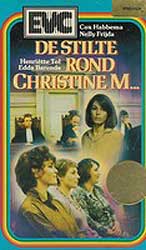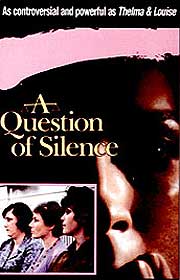This odd film has angered some viewers who believe it expresses the idea that politicized women, feminists in particular, are man-haters at heart. Feminists & non-feminists alike have taken exception to this message of hate, in a story that can be interpreted as praise for the unity of women who would kill a random man.
 I don't want to be the one to deny outright that that is "a" level of meaning to this film, & the woman-dominated audience with whom I saw A Question of Silence (De Stilte rond Christine M., 1982) indeed seemed to delight in the film out of some shared half-secret bloodlust or thrill for blind vendetta. But male anti-heros are frequently rapists or at the very least marvelously charismatic assholes with whom men happily identify & cheer or laugh at their cinematic exploits. I don't want to be the one to deny outright that that is "a" level of meaning to this film, & the woman-dominated audience with whom I saw A Question of Silence (De Stilte rond Christine M., 1982) indeed seemed to delight in the film out of some shared half-secret bloodlust or thrill for blind vendetta. But male anti-heros are frequently rapists or at the very least marvelously charismatic assholes with whom men happily identify & cheer or laugh at their cinematic exploits.
Innocent women killed by men is standard movie fare, & a separate essay could be written on why simply reversing the norm might upset the status quo. To me it's pleasant to see such amoral & "heroic" villainy turning to the "matristic" side of the scale, so that it is no longer just a world where all women live in a world where rape is an easy possibility inflicted on women by men, but a world in which subservient women like waitresses, secretaries, & wives might not be as harmless as required by the men served.
However, to me the film is much more intellectually inspired than that single possible level of meaning. It is first of all based on a true story, & as a fictionalized account of a real event, it is like a meditation on why & how such irrational things can happen. There are dreamlike passages that make it feel like a Great Allegory rather than True Crime, for really it is both.
Christine M. (Edda Barends) is caught shoplifting in a women's clothing store. The owner confronts her for her crime, & when she fights him, two other women in the store, Anna & Annie (Henriette Tol & Nelly Frijda), completely unknown to the shoplifter, eagerly join her in beating the shop owner to death, apparently without the least sense of having done something wrong.
A woman psychiatrist (Cox Habbema) is assigned the task of analyzing these women to discover how these largely normal-seeming individuals without premeditation & without just cause could have come together in these circumstances. She begins with the point of view of the status quo that would prefer to think only psychotics could behave so, but soon finds herself sympathizing with their sense of discrimination in a world where women's shops, like just about everything in the world, are run by men.
Stating it that bluntly makes the film sound like it might be didactic, but it's only got a small amount of didacticism in the script for those few who need things spelled out for them. In the main it's a film of unflinching investigation of subtle frustrations every woman experiences in a society whose highest officials & lowest scum -- from presidents to hobos alike -- tend to be dominated by men. Only if it is volunteerism, housework, childcare, or secretarial support of the dominant male, is it apt to be dominated by women. And every woman, whether or not knowing it, holds within her a hidden rage that is neither unreasonable nor incomprehensible.
Not only was it a male-dominated world these three women rebelled against for one instant, but it was a male world of police officers, court systems, & prison officials who make sure rebels never have an opportunity like that again. As the "white noise" of all womens' lives, it doesn't have to be consciously considered or understood for sublimated rage to be universal among women.
The three killers themselves never do provide a real motive, for the very language (Dutch in this case) is insufficient to express peculiarly female experiences. The implications of their violent act are at once vague & catastrophic.
That random women might break into a moment of uncalculated but coldblooded & randomly targetted revenge, merely for the way things are, is as unsettlingly plausible as teenagers rebelling against parents who cannot see how on earth they deserve the abuse of those they gave life to.
That some audiences can cheer this event, while others feel threatened by it, is evidence of a transitory reversal of power the status quo cannot abide. Those who have the least sentimentality toward the idea of revolt will not be as terrorized by such threat of anarchy or new order.
What these three women have done is not excusable on the basis of such analysis, but it helps explain why they face their punishment of incarceration without sorrow or trepidation, it being in some ways no different than the cages in which they found themselves while purportedly free.
copyright © by Paghat the Ratgirl
|

 I don't want to be the one to deny outright that that is "a" level of meaning to this film, & the woman-dominated audience with whom I saw A Question of Silence (De Stilte rond Christine M., 1982) indeed seemed to delight in the film out of some shared half-secret bloodlust or thrill for blind vendetta. But male anti-heros are frequently rapists or at the very least marvelously charismatic assholes with whom men happily identify & cheer or laugh at their cinematic exploits.
I don't want to be the one to deny outright that that is "a" level of meaning to this film, & the woman-dominated audience with whom I saw A Question of Silence (De Stilte rond Christine M., 1982) indeed seemed to delight in the film out of some shared half-secret bloodlust or thrill for blind vendetta. But male anti-heros are frequently rapists or at the very least marvelously charismatic assholes with whom men happily identify & cheer or laugh at their cinematic exploits.